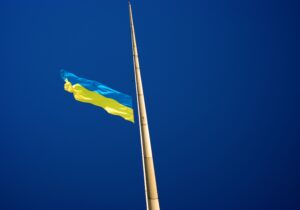In the wake of early April 2022 revelations of Russian atrocities in Bucha and Borodyanka, and with every prospect of more Russian crimes against Ukrainian civilians still to come to light, a peace settlement between Ukraine and Russia would appear all the more distant. Still, talks, sooner or later, will have to become serious.
On March 27, President Volodymyr Zelenskyy floated a peace proposal that would provide for Ukrainian neutrality in exchange for ironclad assurances from the United States and other Western powers guaranteeing his nation’s security against future Russian aggression. Should Washington become a party to such a peace settlement, it should at the same time be prepared to defend Ukraine against inevitable Kremlin pressure to forcibly repatriate Russian prisoners of war.
Why inevitable? Because we should learn from the consequences of the torturous negotiations on this point at Yalta at the end of World War II. Some Russian POWs in Ukrainian hands are bound to resist repatriation for fear of retribution for their surrender, an action Moscow will interpret as a blot on the reputation of its armed forces. The same fear possessed Soviet citizens outside the USSR in 1945. In that year at the Crimean Conference, Franklin Roosevelt and Winston Churchill caved to Joseph Stalin’s insistence upon the forced repatriation of Soviet nationals.
How did it happen that the United States and Great Britain had custody of Soviet nationals at the end of World War II? Of some 8.35 million Red Army prisoners of war and forced laborers (Ostarbeiter) under Nazi control, approximately 5.65 million survived the war scattered across Europe. The Red Army repatriated three million directly while the Western allies took possession of some 2.65 million Soviet displaced persons (DPs). Under terms of two bilateral POW agreements at Yalta, the US and the UK forcibly repatriated 2.35 million Soviet citizens, while approximately 400,000 refugees from Soviet-held territories managed to escape this fate, the largest portion (150,000), incidentally, being ethnic Ukrainians. Treaty language did not specify the use of coercion, but the precedent had been set by the British as early as the fall of 1944, and all concerned privately understood that Soviet citizens would be given no choice other than return to the USSR, ready or not.
Western powers agreed to forced repatriation primarily to ensure the safe return of approximately 50,000 American and British POWs stranded across Eastern Europe—former prisoners of the Germans liberated by the advancing Red Army. Western diplomats feared Stalin might hold these men against their will if all Soviet citizens in the West were not sent home.
A vengeful Stalin insisted upon forced repatriation primarily out of a desire to punish anyone who had helped, or conceivably might have helped, the Nazis: military collaborators, unsurprisingly, but also POWs and forced laborers. Absolutely no reason exists to believe Vladimir Putin has a more charitable view of POWs than Stalin. Russia’s autocrat has called opponents of the Ukraine war, including over 200,000 Russian citizens who have gone voluntarily into exile abroad, “scum and traitors.” He undoubtedly has an even lower opinion of his soldiers who have surrendered in Ukraine.
So February-March 2022 saw a flurry of proposals in print recommending offers of asylum for Russian troops surrendering in Ukraine.
For decades William F. Buckley Jr. and Chaplain William Sloane Coffin Jr. occupied extreme opposite ends of America’s conservative-liberal political divide. Besides Yale and the Central Intelligence Agency, they had very little in common. But on one issue they were in total agreement: they voiced total repugnance for America’s role in the forced repatriation of Soviet citizens after World War II. Buckley decried the act as “most inexcusable” (Dick Cavett Show, June 12, 1978), while Coffin lamented, “The memory… is so painful that it’s almost impossible for me to write about it… My part… left me a burden of guilt I am sure to carry the rest of my life” (Once to Every Man: A Memoir [New York, 1977)], 72 and 77).
Pray that no Americans or Ukrainians at the end of the present war will have to carry a lifetime burden for having repeated the World War II Western allies’ moral failure in yielding to Kremlin pressure to forcibly repatriate Russian POWs against their will. On humanitarian grounds, the United States and Ukraine should have no part in such a postwar settlement that involves ushering Russian soldiers captured in Ukraine into the grasp of a spiteful and malevolent Putin.






 Sponsor a student for Christianity & National Security 2024
Sponsor a student for Christianity & National Security 2024